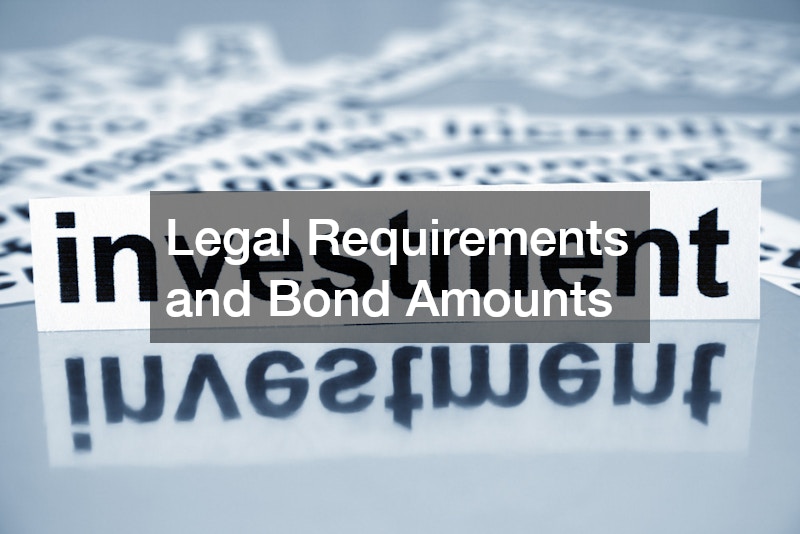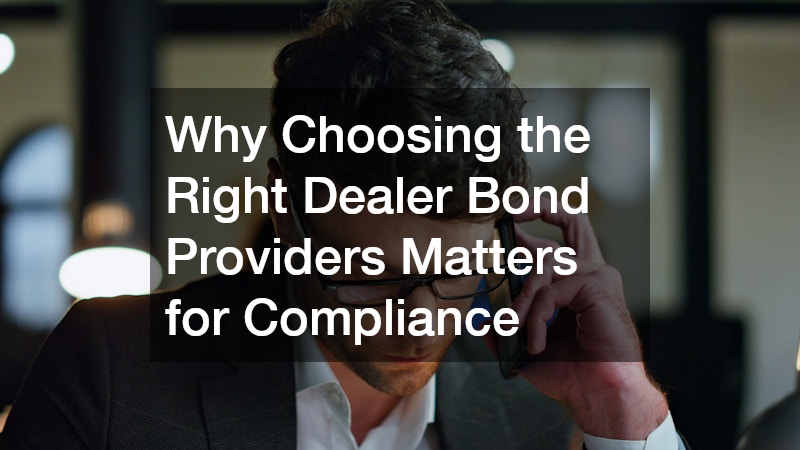
In the world of automotive dealerships, compliance with legal and financial regulations is crucial. Dealer bond providers play a significant role in ensuring this compliance is maintained, protecting both the dealership and its customers. This article explores why selecting the right dealer bond providers is essential for staying compliant and what considerations should be made in this process.
Definition and Purpose of Dealer Bonds
Dealer bonds are a type of surety bond required by most states in the U.S. for automotive dealerships to legally operate. These bonds act as a financial guarantee, ensuring that dealerships comply with all local, state, and federal regulations. Essentially, they provide a layer of accountability and protection both for the state and the consumers engaging with these businesses.
The primary purpose of a dealer bond is to safeguard consumers and the public against potential malpractices by the dealership. By having a dealer bond in place, consumers have financial recourse if a dealership engages in fraudulent or unethical activities. This bond acts as a critical tool in maintaining market integrity and ensuring that dealerships adhere to honest trade practices.
The Role of Bonds in Protecting Consumers and Dealerships
Dealer bonds serve as a protective measure for consumers, offering them compensation in the event a dealership fails to meet legal obligations. By providing this financial safety net, bonds help to build consumer trust in automotive transactions. Dealerships, in turn, benefit from maintaining a good reputation, thanks to the assurance that these bonds offer to their clientele.
Additionally, these bonds act as a safeguard for dealerships by ensuring they adhere to necessary regulations, which can prevent legal disputes and financial losses. The presence of a dealer bond signals to consumers and state authorities that the dealership is committed to operating ethically and responsibly. Thus, maintaining compliance through bonds helps dealerships avoid costly litigation and strengthens their standing in the market.
Legal Requirements and Bond Amounts
The legal requirements for dealer bonds differ across states, with each state setting its own minimum bond amounts necessary to operate. Understanding these requirements is fundamental for dealerships to avoid potential legal complications and penalties. Failure to comply with bond regulations can result in severe consequences, including business suspension or license revocation.
Each state’s bond amount is determined by various factors such as the size of the dealership, location, and sales volume. Dealerships must conduct thorough research and consult with legal experts to ensure they meet the exact bond requirements applicable to their operations. This proactive approach helps in maintaining compliance and safeguarding the dealership from unforeseen financial burdens.
Evaluating Reputation and Reliability
Selecting a dealer bond provider with a strong reputation is vital to ensure that your dealership is supported by a trustworthy institution. A provider’s track record of reliability is an indicator of their commitment to deliver on their promises, which can be crucial during disputes or claim resolutions. Partnering with a reputable provider instills confidence in both the dealership and its customers, fostering long-term business relationships.
To evaluate a provider’s reputation, dealerships can assess client reviews, industry ratings, and testimonials. This due diligence helps in identifying reliable providers who have consistently met the industry’s high standards. By choosing a reputable provider, dealerships are better equipped to navigate potential challenges and maintain compliance with varying state requirements.
Comparing Rates and Terms
Dealer bond providers offer varying rates and terms, making it essential for dealerships to shop around and compare options. Lower rates might be appealing, but they often come with conditions that may not suit every business’s needs. Therefore, a comprehensive assessment of rates and terms ensures that the financial obligations tied to the bond do not burden the dealership unnecessarily.
Understanding the full scope of bond terms is vital, as these may include details like conditions for cancellation, renewal processes, and the repercussions of bond claims. Careful examination of these terms can prevent future disputes and ensure that the dealership remains aligned with provider expectations. This strategic selection not only favors financial planning but also aids in maintaining a long-term, beneficial relationship with the bond provider.
Understanding the Provider’s Expertise in the Auto Industry
Providers with specific expertise in the automotive industry can be invaluable partners for dealerships. These providers possess a deep understanding of the industry’s unique challenges and regulatory landscape, offering tailored solutions that address specific compliance needs. Their expertise can guide dealerships through the complexities of bond requirements, reducing the risk of errors and oversight.
Choosing a knowledgeable provider equips dealerships with insights into best practices and emerging compliance issues. Such collaboration can prove beneficial in proactively managing risks and maintaining adherence to regulatory obligations. Providers with specialized automotive knowledge are more likely to detect potential compliance pitfalls, safeguarding the dealership’s operations and reputation.
Impact on Business Reputation
A dealership’s choice of bond provider significantly influences its business reputation. Partnering with a reputed provider reassures customers and stakeholders of the dealership’s commitment to ethical and transparent business practices. This trust forms the foundation of strong customer relationships and sustained success in the competitive automotive market.
Choosing the right dealer bond provider is a critical decision for any automotive dealership. It ensures compliance with legal obligations, protects against financial risks, and upholds the business’s reputation. By carefully considering reputation, rates, terms, and expertise, dealerships can secure the appropriate coverage, safeguarding their operations and customers alike.


